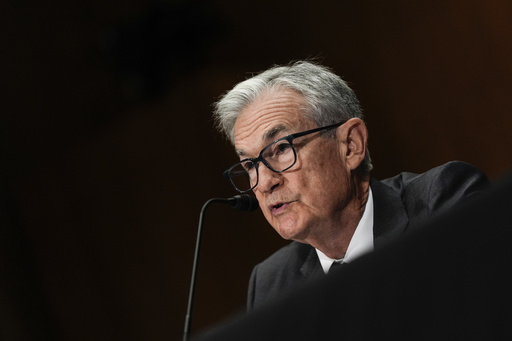WASHINGTON — Federal Reserve Chair Jerome Powell expressed on Wednesday that the broad-ranging tariffs imposed by President Donald Trump are expected to drive inflation in the upcoming months. This pronouncement came amid suggestions from some Republican senators that Powell harbors a bias against these tariffs.
During his second day of biannual testimony at the House and Senate, Powell indicated that consumers would likely bear part of the financial burden due to these import levies. While most Fed officials favor rate cuts this year, Powell urged patience to observe inflationary trends over the coming months. “There will be some inflation from tariffs coming,” Powell remarked under scrutiny from senators at the Senate Banking Committee. He added, “Not yet, but over the course of the coming months.”
Powell pointed out that the tariffs are projected to cost hundreds of billions annually, with a portion affecting consumers. The Fed is awaiting more data on the impact of these duties. Despite Powell’s cautionary stance, some GOP senators took issue with his view. Sen. Pete Ricketts, a Republican from Nebraska, contended the tariffs might result in a one-time price hike without sparking sustained inflation.
Sen. Bernie Moreno, a Republican from Ohio, echoed President Trump’s grievances concerning Powell’s hesitance to cut rates, accusing him of political bias. “You should consider whether you are looking at this through a fiscal lens or a political lens because you just don’t like tariffs,” Moreno criticized, to which Powell left unanswered.
Nevertheless, Powell reaffirmed that most officials on the Fed’s board back the notion of reducing interest rates this year. He also suggested that the potential inflationary effect of the tariffs might be minimal. Meanwhile, Trump has been vocally critical of Powell for not slashing borrowing fees, deriding him as a “numbskull” and a “fool.” Trump advocates for rate cuts to alleviate federal debt service costs. Despite Trump’s pressure, some Fed officials maintain that managing government borrowing costs is not within their mandate.
During a NATO summit press event, Trump mentioned having potential candidates ready to step in when Powell’s term as chair concludes in May 2026, hinting at the possibility of a change in leadership. He pronounced, “I know, within three or four people, who I’m going to pick,” and repeated derogatory remarks towards Powell. Although Trump has threatened to dismiss Powell previously, the prevailing legal consensus is that the president lacks the authority to do so.
Inflation trends have shown signs of moderation this year, with economists worried about the tariffs’ potential impact. Recently, the consumer price index experienced a marginal rise of 0.1% from April to May, suggesting tempered price pressures. Over the past year, consumer prices have seen a rise of 2.4% in May, slightly higher than the 2.3% recorded in April. However, many Wall Street economists forecast that Trump’s tariffs will elevate inflation to between 3% and 3.5% by year’s end.
Senator Elizabeth Warren of Massachusetts, the senior Democrat on the banking committee, mentioned prior to Powell’s testimony that the Fed might have already opted for a rate cut were it not for the inflationary risks due to tariffs. A cut in the Fed’s rate typically reduces borrowing costs for loans such as mortgages and credit cards. “Trump’s chaotic tariff policies are directly causing higher costs for the American people,” Warren commented with concern.


